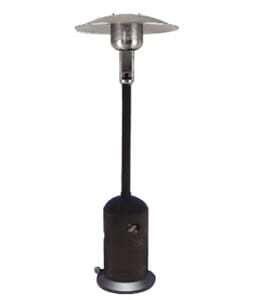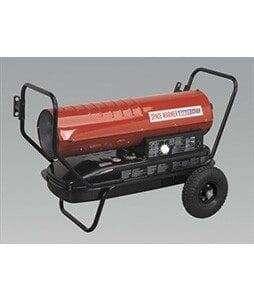Winter is in full swing, and the cold has kept many a grill in storage for the winter. Parties and get-togethers take place exclusively indoors. Patios and back decks which are centerpieces during the summer sit unused for months.
Home isn’t the only place affected by the cold. At work sites, there’s no such thing as a winter break! However, cold fingers can make it a challenge to get things done. Staying on schedule can quickly become a challenge in frigid conditions.
frigid conditions.
Renting a heater for your worksite or patio is the perfect solution for wintertime gatherings and construction alike!
Sully’s Tool & Party Rental offers multiple types of heaters for rental. You can either pick up your rental or we will happily deliver.
Kerosene Heaters: Our kerosene heaters are perfect for work sites and outdoor events alike. All of our kerosene heaters take either kerosene or diesel, so you can fuel upwith what’s most convenient for you!
Propane Heaters: Choose from patio heater or a forced air heater. Both types are great at circulating warm air around an area, whether it’s a room or an open space.

FAQ About Heaters
Have questions? Check out some of the most frequently asked questions below.
Kerosene vs. Propane: What’s the Difference?
Since both kerosene and propane heaters produce heat and usually look much alike, you may be wondering if there’s any difference between the two.
Propane heaters use cylinders filled with natural gas. While these cylinders can be large, there is no risk of contaminants getting into the fuel. Propane heaters are usually larger and can be bulky, which may make them a better option for stationary use – not for transporting around a job site. Propane heaters may pose a slightly higher risk of carbon monoxide poisoning if used in a space which is not properly ventilated.
Kerosene uses liquid fuel such as diesel or kerosene. Kerosene can also come in cylinders much like propane, although these are usually smaller than propane cylinders. Kerosene heaters are usually easier to transport around a job site. These types of heaters are not as environmentally friendly as propane heaters. The risk of carbon monoxide poisoning with a kerosene heater is present, but not as high as with a propane heater.
Which is better for a Work Site?
Either a kerosene or propane heater will work for a worksite. The type you choose depends on the size of the project, the location, the duration, and whether the heater will be moved regularly. Our friendly staff at Northside Tool Rental can help with any questions or concerns you may have!
Which is better for a Winter Grill Out?
Planning a party but do not want your guests feeling trapped inside? Our Patio Heater is perfect for you! It’s easy to set up and use. The wide umbrella of heat this heater provides allows your guests to pull up their chairs around the base to enjoy themselves while staying warm.
What’s a BTU, Anyway?
BTU stands for ‘British Thermal Unit’. A BTU is a measure of thermal energy – in other words, the amount of work it takes to heat one pound of water by one degree Fahrenheit. The higher the BTUs your heater has, the more powerful it will be.
What is Infrared Heat?
Infrared heaters work by producing heat from infrared light – a form of light that is invisible to our eyes. The heat that these types provide is almost instant, which is especially helpful in very cold conditions! However, infrared heaters aren’t for everyone. Unlike space heaters, they heat a specific area – not the whole room.
Pros of Infrared:
- Provides instant heat
- Quiet operation
- Infrared doesn’t dry out a room
Cons of Infrared:
- The coils of an infrared heater can heat up to dangerously hot levels
- Heats a limited amount of space, usually directly in front of the coils
- Stops heating when off – no residual heat from a unit that is cooling down
Safety Tips
When it’s cold, it’s very tempting to turn on your portable heater full blast. But before you crank up the dial to maximum, keep in mind these safety tips:
- Just like your personal home heaters, don’t leave a commercial-grade heater unattended.
- Set your heater on a flat, stable surface, and make sure it’s secure before using.
- Don’t touch the surface of the heater with your bare hand while the heater is operating.
- Make sure that any heaters at a work site are in a well-ventilated area. Both kerosene and propane heaters produce carbon monoxide, and exposure to significant amounts can cause illness or death.
- Keep all flammable objects such as curtains, posters, etc, at least three feet away from the heater.
- Test your smoke alarm regularly.
